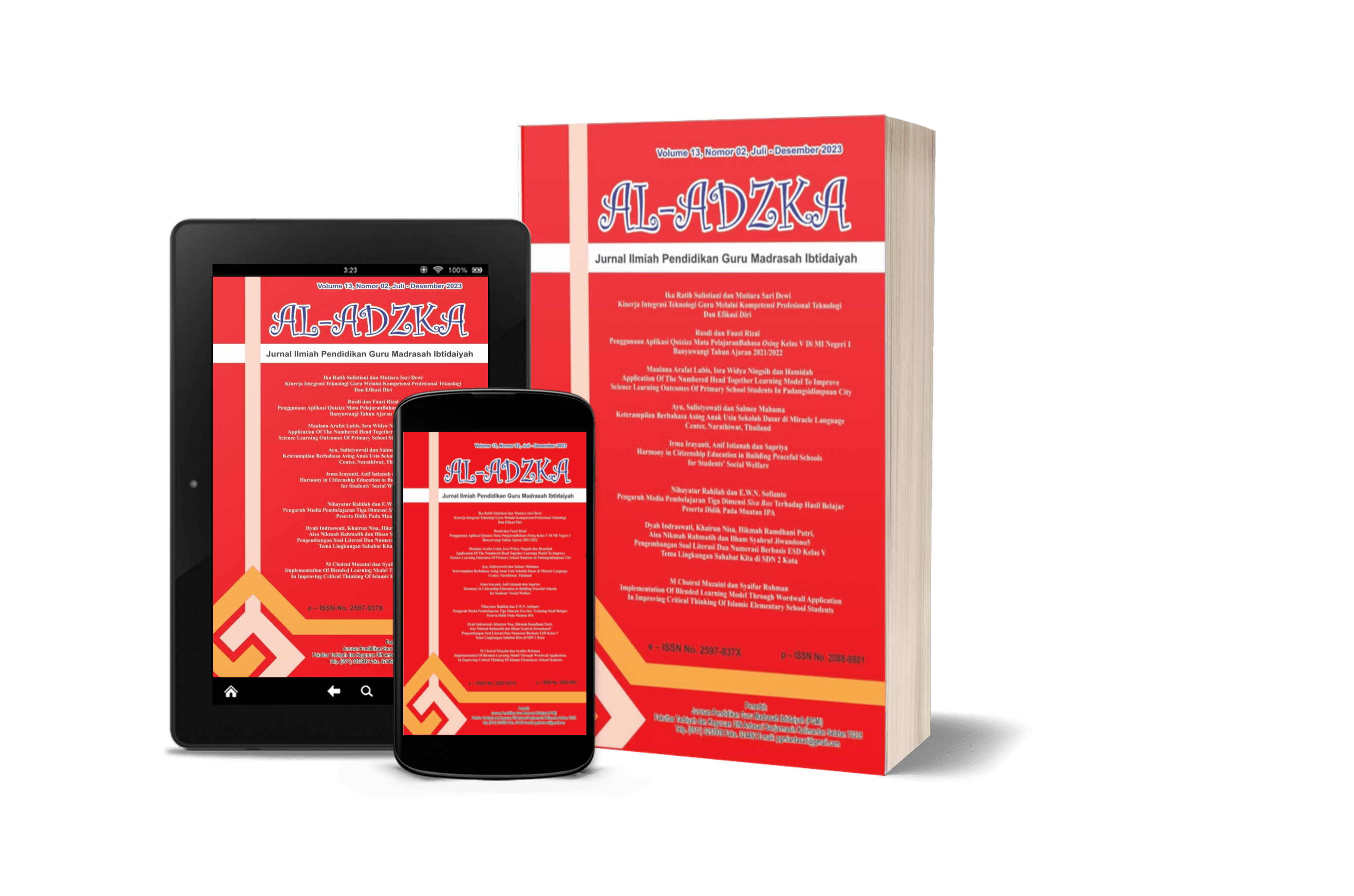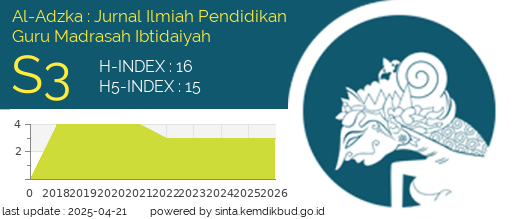The Feasibility of Indonesian Scientific-Based Learning Module with Time Token Arend Method
DOI:
https://doi.org/10.18592/aladzkapgmi.v11i1.3993Abstract
This study aims to determine the feasibility of teaching materials in the form of scientific- based learning modules with the Arend Time token learning method, where the steps of this learning activity are designed so that students are actively involved in the learning process and carry out the social interaction process with other friends and can contribute actively. This study used Research and Development (R & D) with the Sugiyono method which consisted of 10 stages, however the researcher only used 7 stages due to the current state of Covid-19. These stages are (1) potential and problems, (2) data collection, (3) product design, (4) design validation, (5) design revision, (6) Product Revision, then followed by (7) limited production. Then the module is validated by experts consisting of design, material, and language experts using a questionnaire in the form of a validation sheet. The result of this research is that the percentage of eligibility results of design experts is 81.25% with very valid categories, 93% material experts with very valid categories, and linguists of 84.61% with very valid categories. So it can be concluded that the scientific- based Indonesian learning module with the time token method for grade IV SD / MI is feasible to use to make students actively involved in the process of learning activities.References
Hanafi. (2017). Konsep Penelitian R & D Dalam Bidang Pendidikan. Saintifika Islamica: Jurnal Kajian Keislaman, 4(2), 129–150.
Huda, Miftahul. 2014. Model-Model Pengajaran dan Pembelajaran. Yogyakarta: Pustaka Pelajar.
Hindun. 2014. Pembelajaran Bahasa Indonesia Berkarakter di Madrasah Ibtidaiyah/Sekolah Dasar. Depok: Nufa Citra Mandiri.
Daryanto, 2014. Pendekatan Pembelajaran Saintifik Kurikulum 2013. Yogyakarta: Penerbit Gava Media.
Sugiyono. 2018. METODE PENELITIAN Kuantitatif, Kualitatif, R&D. Bandung : ALFABETA
Harta, I., Tenggara, S., & Kartasura, P. (2014). Pengembangan Modul Pembelajaran untuk Meningkatkan Pemahaman Konsep dan Minat SMP. Pythagoras: Jurnal Pendidikan Matematika, 9(2), 161–174. https://doi.org/10.21831/pg.v9i2.9077
Achmad, Sri Wintala. 2015. Bahasa dan Sastra Indonesia Pedoman Praktis Menulis Dalam Bahasa Indonesia. Yogyakarta: Araska.
Alek. H. Achmad. 2010. Bahasa Indonesia Untuk Perguruan Tinggi. Jakarta: Prenada Media Group.
Aditia, M. Taufik & Muspiroh, N. (2013). Pengembangan Modul Pembelajaran Berbasis Sains, Lingkungan, Teknologi, Masyarakat Dan Islam (Salingtemasis) Dalam Meningkatkan Hasil Belajar Siswa Pada Konsep Ekosistem Kelas X Di Sma Nu
(Nadhatul Ulama) Lemahabang Kabupaten Cirebon. Scienticiae Educatia, 2(2), 1–20.
Hanafi. (2017). Konsep Penelitian R & D Dalam Bidang Pendidikan. Saintifika Islamica: Jurnal Kajian Keislaman, 4(2), 129–150.
Sulistiawati, T. (2017). Pengaruh Model Pembelajran Time Token Terhadap Kemampuan Berbicara Siswa Pada Mata Pelajaran Bahasa Indonesia Kelas III MIN 7 Bandar Lampung. 1–97. http://repository.radenintan.ac.id/462/1/skripsi_tika.pdf
Yansyah, N. F., Asmahasanah, S., & Hakiem, H. (2019). Pembelajaran Tematik Terpadu Melalui Pendekatan Saintifik Berbasis Lingkungan. Caruban: Jurnal Ilmiah Ilmu Pendidikan Dasar, 2(1), 40. https://doi.org/10.33603/.v2i1.2349
Mukharim, Sifa Siti. 2014. 53 Metode Belajar dan Pembelajaran. Bandung: Bumi Siliwangi. Musfiqon, & Nurdyansyah. 2015. Pendekatan Pembelajaran Saintifik. Sidoarja: Nizamia
Learning Center.
Downloads
Published
How to Cite
Issue
Section
License
Authors who publish with this journal agree to the following terms:
- Authors retain copyright and grant the journal right of first publication with the work simultaneously licensed under a Creative Commons Attribution 4.0 International that allows others to share the work with an acknowledgement of the work's authorship and initial publication in this journal.
- Authors are able to enter into separate, additional contractual arrangements for the non-exclusive distribution of the journal's published version of the work (e.g., post it to an institutional repository or publish it in a book), with an acknowledgement of its initial publication in this journal.
- Authors are permitted and encouraged to post their work online (e.g., in institutional repositories or on their website) prior to and during the submission process, as it can lead to productive exchanges, as well as earlier and greater citation of published work.












